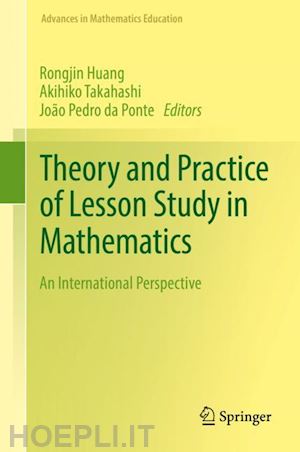
Questo prodotto usufruisce delle SPEDIZIONI GRATIS
selezionando l'opzione Corriere Veloce in fase di ordine.
Pagabile anche con Carta della cultura giovani e del merito, 18App Bonus Cultura e Carta del Docente
This book brings together and builds on the current research efforts on adaptation, conceptualization, and theorization of Lesson Study (LS). It synthesizes and illustrates major perspectives for theorizing LS and enriches the conceptualization of LS by interpreting the activity as it is used in Japan and China from historical and cultural perspectives. Presenting the practices and theories of LS with practicing teachers and prospective teachers in more than 10 countries, it enables the reader to take a comparative perspective. Finally, the book presents and discusses studies on key aspects of LS such as lesson planning, post-lesson discussion, guiding theories, connection between research and practice, and upscaling.
Lesson Study, which has originated in Asia as a powerful effective professional development model, has spread globally. Although the positive effects of lesson study on teacher learning, student learning, and curriculum reforms have been widely documented,conceptualization of and research on LS have just begun to emerge. This book, including 38 chapters contributed by 90 scholars from 21 countries, presents a truly international collaboration on research on and adaptation of LS, and significantly advances the development of knowledge about this process.
Chapter 15: "How Variance and Invariance Can Inform Teachers’ Enactment of Mathematics Lessons" of this book is available open access under a CC BY 4.0 license at link.springer.com
Theory and Practice of Lesson Study in Mathematics: An International Perspective shows that the power of Lesson Study to transform the role of teachers in classroom research cannot be explained by a simple replication model. Here we see Lesson Study being successful internationally when its key principles and practices are taken seriously and are adapted to meet local issues and challenges.
(Max Stephens, Senior research fellow at TheUniversity of Melbourne)
It works. Instruction improves, learning improves. Wide scale? Enduring? Deep impact? Lesson study has it. When something works as well as lesson study does, while alternative systems for improving instruction fail, or only succeed on small scale or evaporate as quickly as they show promise, it is time to understand how and why lesson study works. This volume brings the research on lesson study together from around the world. Here is what we already know and here is the way forward for research and practice informed by research. It is time to wake up and pay attention to what has worked so well, on wide scale for so long.
(Phil Dara, A leading author of the Common Core State Standards of Mathematics in the U.S.)
Dr. Akihiko Takahashi is an Associate Professor at DePaul University. He teaches mathematics and mathematics education for prospective teachers. He was a teacher in Japan before becoming an educator of mathematics teachers. During his teaching career, he was nationally active in mathematics lesson study in Japan. He received his Ph.D. from the University of Illinois at Urbana-Champaign; his dissertation research focused on internet use in mathematics education. He has published over 60 journal articles and book chapters in English and Japanese and given over 50 presentations and keynote at conferences and workshops in Canada, Chile, Germany, Indonesia, Ireland, Japan, Korea, Malawi, Malaysia, Mexico, Philippine, Qatar, Singapore, Thailand, Uganda, United Kingdom, and United States.
Dr. João Pedro da Ponte is Professor at Universidade de Lisboa. He made his doctoral studies at the University of Georgia (USA), and was a Visiting Professor at San Diego (USA), UNICAMP (Brazil), and Granada (Spain). His current main research interests are mathematics teaching practices and teacher education and the teaching and learning of rational numbers and algebra. He coordinated a government report about pre-service teacher education (2006) and a new mathematics curriculum for basic education (2007) and collaborates with the Portuguese association of teachers of mathematics. He has supervised thirty one PhD dissertations and is author and co-author of several books and articles in national and internationaljournals such as BOLEMA, RELIME, Educational Studies in Mathematics, Journal of Mathematics Teacher Educations, and ZDM Mathematics Education.











Il sito utilizza cookie ed altri strumenti di tracciamento che raccolgono informazioni dal dispositivo dell’utente. Oltre ai cookie tecnici ed analitici aggregati, strettamente necessari per il funzionamento di questo sito web, previo consenso dell’utente possono essere installati cookie di profilazione e marketing e cookie dei social media. Cliccando su “Accetto tutti i cookie” saranno attivate tutte le categorie di cookie. Per accettare solo deterninate categorie di cookie, cliccare invece su “Impostazioni cookie”. Chiudendo il banner o continuando a navigare saranno installati solo cookie tecnici. Per maggiori dettagli, consultare la Cookie Policy.